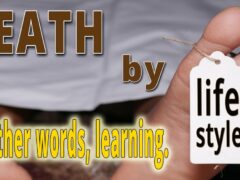Re: Stanford School of Medicine – March 21, 2012 – Imaging study reveals differences in brain function for children with math anxiety This study is important reading for anyone interested in understanding the emergence of neuroscience in support of unhealthy learning, maladaptive schema, and Mind-Shame. Absent from the article are two critical distinctions: 1) Math Anxiety is a form […]
Tag Archives | unhealthy learning
Re: Tuning In to Dropping Out
Re: “Tuning In to Dropping Out” in the Chronicle of Higher Education We could learn a lot more than we are about education through the lens of economics and economic models of thought. We’ve talked with Heckman, Hanushek, Rolnick and others about our general lack of appreciation for the ‘capital value’ of ‘healthy learning’ and […]
Share this:
- Share on Facebook (Opens in new window) Facebook
- Share on X (Opens in new window) X
- Share on LinkedIn (Opens in new window) LinkedIn
- Share on Pinterest (Opens in new window) Pinterest
- Share on Pocket (Opens in new window) Pocket
- Share on Reddit (Opens in new window) Reddit
- Share on Telegram (Opens in new window) Telegram
- Share on Tumblr (Opens in new window) Tumblr
- Share on WhatsApp (Opens in new window) WhatsApp
- Email a link to a friend (Opens in new window) Email
- Print (Opens in new window) Print

Other Words for Learning: Lifestyle
INTERHEART Study: Over 90% of heart attacks (myocardial infractions) can be attributed to lifestyle. America Cancer Society: There is an 82% correlation between lifestyles and cancers. Lifestyle (n.): First used in 1921 by psychologist Alfred Adler for “a person’s basic character as established early in childhood”. Since 1961 the word has broadly meant, “a way or style of living” […]
Share this:
- Share on Facebook (Opens in new window) Facebook
- Share on X (Opens in new window) X
- Share on LinkedIn (Opens in new window) LinkedIn
- Share on Pinterest (Opens in new window) Pinterest
- Share on Pocket (Opens in new window) Pocket
- Share on Reddit (Opens in new window) Reddit
- Share on Telegram (Opens in new window) Telegram
- Share on Tumblr (Opens in new window) Tumblr
- Share on WhatsApp (Opens in new window) WhatsApp
- Email a link to a friend (Opens in new window) Email
- Print (Opens in new window) Print
Re: “We only use 10% of our Brains anyway!”
The Brain Clock “Times” featured a story entitled: “We only use 10% of our Brains anyway!” The story, while dispelling the “we only use 10% of our brain” misconception, perpetuates an even more insidious one. The author traces the origin of the 10% myth back to William James who is reported to have said: “We […]
Share this:
- Share on Facebook (Opens in new window) Facebook
- Share on X (Opens in new window) X
- Share on LinkedIn (Opens in new window) LinkedIn
- Share on Pinterest (Opens in new window) Pinterest
- Share on Pocket (Opens in new window) Pocket
- Share on Reddit (Opens in new window) Reddit
- Share on Telegram (Opens in new window) Telegram
- Share on Tumblr (Opens in new window) Tumblr
- Share on WhatsApp (Opens in new window) WhatsApp
- Email a link to a friend (Opens in new window) Email
- Print (Opens in new window) Print
Re: Discovering How to Learn Smarter
Re: Discovering How to Learn Smarter http://mindshift.kqed.org/2012/02/discovering-how-to-learn-smarter/ Responded on two levels: 1) re: self-esteem: There is a difference between self-esteem as accumulated positivity and self-esteem as a buoyant absence of self-negativity. Of the two major domains of unhealthy learning, maladaptive cognitive schema and unconscious emotional aversions, the later, and in particular ‘mind-shame’, is largely the result of learned self-disesteem. 2) learning about the […]
Share this:
- Share on Facebook (Opens in new window) Facebook
- Share on X (Opens in new window) X
- Share on LinkedIn (Opens in new window) LinkedIn
- Share on Pinterest (Opens in new window) Pinterest
- Share on Pocket (Opens in new window) Pocket
- Share on Reddit (Opens in new window) Reddit
- Share on Telegram (Opens in new window) Telegram
- Share on Tumblr (Opens in new window) Tumblr
- Share on WhatsApp (Opens in new window) WhatsApp
- Email a link to a friend (Opens in new window) Email
- Print (Opens in new window) Print
Re: Forbes Spotlights Neuroeducation as Top trend
The post asks: Will the science of the brain give us new ways to engage with kids to improve their chances for lifelong learning? My response: No doubt brain science can provide us valuable information about the difference between brain ‘healthy’ and ‘unhealthy’ learning. But it must always be remembered that there is a ‘being’ […]
Share this:
- Share on Facebook (Opens in new window) Facebook
- Share on X (Opens in new window) X
- Share on LinkedIn (Opens in new window) LinkedIn
- Share on Pinterest (Opens in new window) Pinterest
- Share on Pocket (Opens in new window) Pocket
- Share on Reddit (Opens in new window) Reddit
- Share on Telegram (Opens in new window) Telegram
- Share on Tumblr (Opens in new window) Tumblr
- Share on WhatsApp (Opens in new window) WhatsApp
- Email a link to a friend (Opens in new window) Email
- Print (Opens in new window) Print
